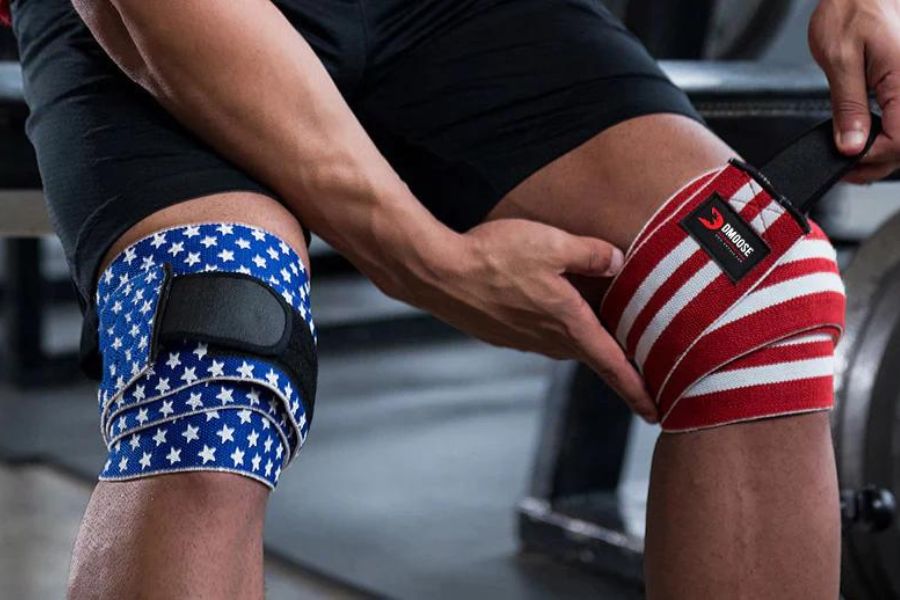Squats are a fundamental weightlifting and strength training exercise that can help improve lower body strength, power, and athletic performance. However, squats can also stress the knees significantly and increase the risk of knee injuries, such as strains, sprains, and patellar tendonitis.
Knee support is, therefore, essential during squats to prevent injuries and enhance performance. Knee sleeves and knee wraps are two popular forms of knee support used by athletes and fitness enthusiasts during squats.
Knee sleeves and knee wraps work differently to provide knee support and have different levels of support, compression, and flexibility. Knee sleeves are typically made of neoprene or similar synthetic material and slide over the knee to provide mild to moderate support and compression.
Knee wraps are made of elastic cloth or bandage and wrap around the knee joint to provide significant support and compression. Knee wraps are typically thicker than knee sleeves and may limit knee joint flexibility and range of motion.
The choice between knee sleeves and knee wraps depends on several factors, such as the type of lifting, training goals, and personal preferences. This article will provide an in-depth comparison of knee sleeves vs. knee wraps for squats to help you make an informed decision.
We will explore the benefits, limitations, safety considerations, and expert opinions on knee sleeves and wraps to help you choose the proper knee support for your squats.
Related Article: 15 Common Squat Form Mistakes You Need to Avoid
Knee Sleeves
Knee sleeves are a popular form of knee support used by athletes and fitness enthusiasts during squats. Knee sleeves are made of neoprene or similar synthetic material and slide over the knee to provide support and compression.
Knee Sleeves for Weightlifting and Powerlifting are designed to warm the knee joint, improve blood flow, and reduce inflammation and pain during squats. Knee sleeves also support the knee cap and improve proprioception or body awareness during movement.
Knee sleeves are typically made of durable and elastic material and come in various sizes and thicknesses.
Knee sleeves offer several benefits for squats, such as:
- Support: Knee sleeves provide mild to moderate support to the knee joint and help prevent injuries such as strains, sprains, and patellar tendonitis. Knee sleeves compress the knee joint and provide stability during squats, reducing the risk of a knee injury.
- Compression: Knee sleeves offer mild to moderate compression to the knee joint, which reduces swelling, inflammation, and pain. Knee sleeves increase blood flow to the knee joint and help remove waste products, reducing soreness and stiffness after squats.
- Warmth: Knee sleeves keep the knee joint warm, which increases blood flow, reduces muscle stiffness, and improves flexibility. Knee sleeves also promote faster recovery after squats by increasing the delivery of nutrients and oxygen to the muscles.
- Proprioception: Knee sleeves improve body awareness and reduce the risk of injury by providing feedback on knee position and movement. Knee sleeves can improve technique and form during squats, reducing the risk of a knee injury.
Knee sleeves have some limitations for squats, such as:
- Limited Support: Knee sleeves provide mild to moderate support, which may not be sufficient for heavy lifting or powerlifting. Knee sleeves are suitable for athletes who want to prevent mild to moderate knee injuries but may not provide enough support for heavy loads or maximal efforts.
- Limited Compression: Knee sleeves provide mild to moderate compression, which may not be sufficient for reducing severe swelling or inflammation. Knee sleeves are suitable for athletes who want to reduce mild to moderate soreness and stiffness after squats but may not be enough for acute injuries or chronic conditions.
- Limited Flexibility: Knee sleeves can limit knee joint flexibility and range of motion during squats, which may affect performance. Knee sleeves can restrict the natural movement of the knee joint and make it harder to perform certain squat variations.
When choosing knee sleeves for squats, it is essential to consider the right size and fit. Knee sleeves that are too tight or loose may not provide adequate support or compression and may cause discomfort or restrict movement. Choosing knee sleeves made of durable and breathable material is also essential to avoid overheating and skin irritation.
In summary, knee sleeves are a popular form of knee support for squats with mild to moderate support, compression, warmth, and proprioception. Knee sleeves are suitable for athletes who want to prevent mild to moderate knee injuries, reduce pain and inflammation, and improve body awareness during squats.
However, knee sleeves may not be sufficient for heavy lifting or powerlifting and may limit knee joint flexibility and range of motion.
Knee Wraps
Knee wraps are a common type of knee support used by strength athletes and powerlifters during squats. Unlike knee sleeves, knee wraps are made of an elastic bandage or cloth tightly wrapped around the knee joint. It creates significant compression, providing stability and support to the joint during squats.
Related Article: Leg Presses Vs. Squats: Which One Is Better for Your Body?
Some of the benefits of using Weightlifting Knee Wraps for squats include the following:
- Increased Power Output: Knee wraps can help increase power output during squats by creating elastic energy that assists in the upward phase of the lift. It allows lifters to generate more force, lift heavier weights, or perform maximal efforts. You can also use Lifting Hooks to lift heavier weights.
- Enhanced Joint Stability: Knee wraps provide substantial support and compression to the knee joint, which can help improve joint stability during squats. This can reduce the risk of injury, such as strains, sprains, and patellar tendonitis.
- Customizable Support: Knee wraps can be customized to provide varying levels of support and compression, depending on the lifter's needs and preferences. They can be wrapped tighter or looser to provide more or less support.
- Reduced Soreness and Stiffness: Knee wraps can help reduce soreness and stiffness in the knee joint after squats by increasing blood flow and removing waste products. It can help improve recovery time between workouts.
However, there are also some limitations to using knee wraps for squats:
- Technique: Correct wrapping technique is essential when using knee wraps for squats. An incorrect wrapping technique can lead to discomfort, restricted movement, and reduced performance. It can take time to master the proper technique.
- Restricted Movement: Knee wraps can limit knee joint flexibility and range of motion during squats, affecting performance. They can restrict the natural movement of the knee joint and make it harder to perform certain squat variations.
- Safety: Knee wraps provide significant support and compression, which can mask pain and injury. This can make it difficult to detect and address underlying knee joint problems. Experienced lifters should only use knee wraps under proper supervision and guidance.
When choosing knee wraps for squats, selecting a durable, elastic material that can withstand the rigors of heavy lifting is important. The level of support and compression the knee wraps provide should also be tailored to the lifter's needs and preferences.
In conclusion, knee wraps are a popular choice for lifters who want to increase their power output and joint stability and customize their level of support and compression. However, they require a specific wrapping technique, can restrict movement, and should be used cautiously to prevent masking pain and injury.
Knee Sleeves Vs. Knee Wraps
Now that we have explored the benefits and limitations of knee sleeves and knee wraps, comparing the two types of knee support for squats is essential.
One of the main differences between knee sleeves and knee wraps is the level of support and compression they provide. Knee sleeves offer moderate compression and support, while knee wraps provide significant compression and support.
Knee sleeves are ideal for lifters who want moderate support and compression during squats while maintaining natural movement and flexibility in the knee joint. They are also suitable for lifters who want to reduce knee pain and inflammation and improve recovery time between workouts.
On the other hand, knee wraps are suitable for experienced lifters who want to increase their power output and joint stability and customize their level of support and compression during squats. They also benefit lifters who want to lift heavier weights or perform maximal efforts.
Another difference between knee sleeves and knee wraps is the ease of use. Knee sleeves are easy to slip on and off and require no specific wrapping technique. They are also comfortable to wear for extended periods and can be worn during warm-up sets and throughout the workout.
Knee wraps, however, require a specific wrapping technique that takes time to master. They can also be uncomfortable to wear for extended periods of time and can restrict natural knee joint movement, which may affect performance.
Ultimately, the choice between knee sleeves and knee wraps for squats depends on the lifter's needs, goals, and preferences. Both knee sleeves and knee wraps have benefits and limitations and can be effective when used correctly.
It is important to remember that knee sleeves and knee wraps should not be used as a substitute for proper squat technique and should be used under proper supervision and guidance to prevent injury.
Choosing the Right Knee Support
When deciding between knee sleeves and knee wraps, it is important to consider the specific lifting situation, training goals, and experience level. Choosing the appropriate knee support can help improve performance, prevent injury, and enhance recovery time between workouts.
Type of Lifting
The type of lifting you are performing is a critical factor in choosing between knee sleeves and knee wraps. Knee sleeves are ideal for exercises that require moderate support and compression, such as squats, lunges, and leg presses. They provide moderate support and allow for natural knee joint movement and flexibility.
On the other hand, knee wraps are better suited for heavy lifting and maximal efforts. They provide a higher level of support and compression than knee sleeves, which is beneficial when performing exercises that require maximal power output, such as powerlifting or weightlifting competitions.
Training Goals
Your training goals also play a significant role in determining which knee support is appropriate for you. Knee wraps may be suitable if your goal is to increase overall strength. They can help you lift heavier weights and increase your power output, improving strength gains.
Knee sleeves may be a better choice if you aim to improve your overall fitness and reduce the risk of injury. They can help reduce knee pain and inflammation, improve recovery time between workouts, and enhance joint stability.
Level of Experience
Your experience level is another crucial factor in choosing the right knee support. Knee sleeves are an excellent choice if you are new to squatting or lifting. They provide moderate support and compression, which can help prevent injury and improve your overall lifting technique.
Knee wraps may be a suitable option if you are an experienced lifter and are comfortable with the correct wrapping technique.
In conclusion, choosing the right knee support depends on the specific lifting situation, training goals, and level of experience.
The Bottom Line
Knee sleeves and knee wraps are two common forms of knee support used in weightlifting and powerlifting.
Knee sleeves provide moderate support and compression, reduce knee pain and inflammation, and enhance recovery time between workouts. Knee wraps, on the other hand, provide higher support and compression and are better suited for heavy lifting and maximal efforts.
When deciding which type of knee support to use, it is crucial to consider the specific lifting situation, training goals, and experience level.
Choosing the appropriate knee support can help improve performance, prevent injury, and enhance recovery time between workouts.
Ultimately, the decision of whether to use knee sleeves or knee wraps is a personal one based on individual preferences and needs. It is essential to consult a trainer or healthcare professional to determine which type of knee support is best for you based on your specific situation and goals.








